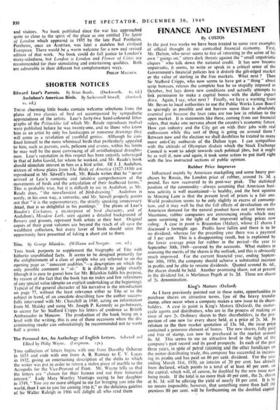FINANCE AND INVESTMENT
By CUSTOS IN the past two weeks we have been treated to some rare example of official thought in our controlled financial economy. First, Mr. Dalton, who never seems to tire of returning to the scene of his own " goings on," utters dark threats against the " small unpatriotic cliques " who talk down the national credit. It has now become unpatriotic, it seems, to write or speak in a critical sense of the Government's financial policies lest it disturb the gilt-edged market or the value of sterling in the free markets. What next ? Then Sir Stafford Cripps, who now seems to have got a " thing" about scrip bonuses, relaxes the complete ban he so stupidly imposed in October, but lays down new conditions and actually attempts to link permission to make a capital bonus with the dollar export drive. Again, I say, what next ? Finally, we have a warning from Mr. Bevan to local authorities to use the Public Works Loan Board as sparingly as possible and not borrow more than is absolutely essential just because the loan rates are too low in relation to the open market. It is statements like these, coming from our financial rulers, that make one nervous about the country's economic future. How can industry and the City get on with their jobs with real enthusiasm while this sort of thing is going on around them ? Between now and the election we shall doubtless be treated to many more anti-City outbursts of the Dalton type. I can sympathise with the attitude of Olympian disdain which the Stock Exchange Council is wont to adopt towards such political jibes, but it might be as well if, now and again, it took some action to put itself right with the less instructed sections of public opinion.
Rubber Price Improves
Influenced mainly by American stockpiling and some heavy pur- chases by Russia, the London price of rubber, around Is. 3d. a pound, has now recovered to its post-war peak. The statistical position of the commodity—always assuming that American busi- ness activity is well maintained—is healthy, and the best opinion in Mincing Lane is that the present level of prices is a fair one. World production seems to be only slightly in excess of consump- tion, and it may well be that the full effects of devaluation on the American demand for the natural product have not yet been seen. Meantime, rubber companies are announcing results which may seem surprising in the light of the improved selling prices now ruling. A case in point is Braunston (Malay), whose £1 shares I discussed a fortnight ago. Profits have fallen and there is to be no dividend. whereas for the preceding year there was a payment of 3 per cent. This is a disappointing result, but is explained by the lower average price for rubber in the period—the year to September 30th, 1949—covered by the accounts. What matters in assessing the merits of the shares is the outlook, and this is obviously much improved. For the current financial year, ending Septem- ber 30th, 1950, the company should achieve a substantial increase in profits and be able to resume dividends. Quoted around 8s. 6d., the shares should be held. Another promising share, not at present in the dividend list, is Merlimau Pegoh at Is. 2d. These are shares of 2s. denomination.
King's Motors (Oxford)
As I have previously pointed out in these notes, opportunities to purchase shares on attractive terms, km of the heavy transfer stamp, often occur when a company makes a new issue to its share- holders. A case in point is King's Motors (Oxford), the motor- cycle agents and distributors, who are in the process of making an issue of new 2s. Ordinary shares to their shareholders, in the pro- portion of one new for every share held, at a price of 2s. 3d. In relation to the then market quotation of 13s. 9d., the issue price contained a generous element of bonus. The new shares, fully paid and free of stamp, can now be purchased in the market around 8s. 3d. This seems to me an attractive level in the fight of the company's past record and its good prospects. In each of the past three years, in spite of petrol rationing and the other handicaps on the motor-distributing trade, this company has succeeded in increas- ing its profits and has paid an 80 per cent. dividend. For the year ending March 31st, 1950, an interim of 20 per cent. has already been declared, which points to a total of at least 40 per cent. on the capital, which will, of course, be doubled by the new issue now being made. If the total is no more than 40 per cent., the 2s. shares at 8s. 3d. will be offering the yield of nearly 10 per cent. It is by no means impossible, however,. that something more than half the previous 80 per cent. will be forthcoming on the doubled capital.






























 Previous page
Previous page